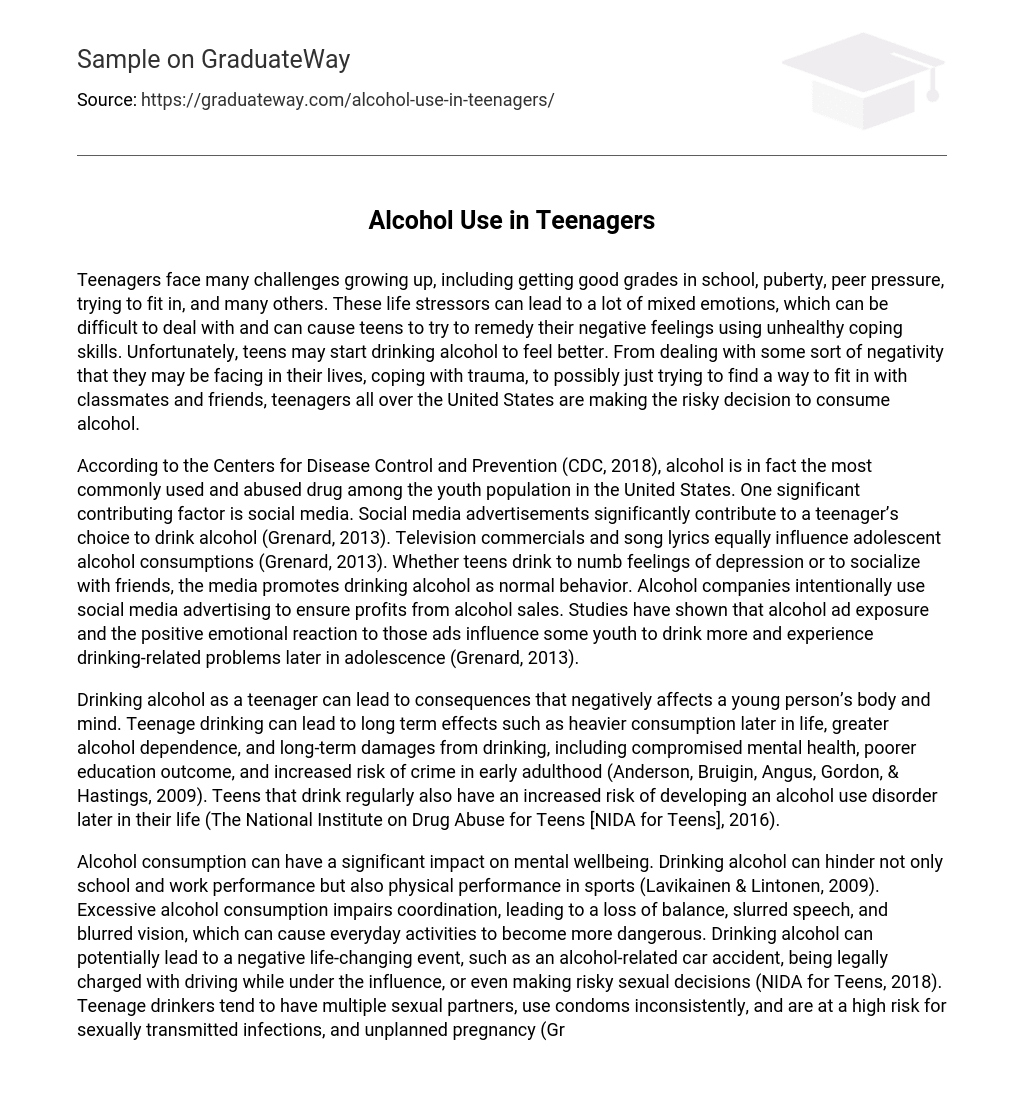Teenagers face many challenges growing up, including getting good grades in school, puberty, peer pressure, trying to fit in, and many others. These life stressors can lead to a lot of mixed emotions, which can be difficult to deal with and can cause teens to try to remedy their negative feelings using unhealthy coping skills. Unfortunately, teens may start drinking alcohol to feel better. From dealing with some sort of negativity that they may be facing in their lives, coping with trauma, to possibly just trying to find a way to fit in with classmates and friends, teenagers all over the United States are making the risky decision to consume alcohol.
According to the Centers for Disease Control and Prevention (CDC, 2018), alcohol is in fact the most commonly used and abused drug among the youth population in the United States. One significant contributing factor is social media. Social media advertisements significantly contribute to a teenager’s choice to drink alcohol (Grenard, 2013). Television commercials and song lyrics equally influence adolescent alcohol consumptions (Grenard, 2013). Whether teens drink to numb feelings of depression or to socialize with friends, the media promotes drinking alcohol as normal behavior. Alcohol companies intentionally use social media advertising to ensure profits from alcohol sales. Studies have shown that alcohol ad exposure and the positive emotional reaction to those ads influence some youth to drink more and experience drinking-related problems later in adolescence (Grenard, 2013).
Drinking alcohol as a teenager can lead to consequences that negatively affects a young person’s body and mind. Teenage drinking can lead to long term effects such as heavier consumption later in life, greater alcohol dependence, and long-term damages from drinking, including compromised mental health, poorer education outcome, and increased risk of crime in early adulthood (Anderson, Bruigin, Angus, Gordon, & Hastings, 2009). Teens that drink regularly also have an increased risk of developing an alcohol use disorder later in their life (The National Institute on Drug Abuse for Teens [NIDA for Teens], 2016).
Alcohol consumption can have a significant impact on mental wellbeing. Drinking alcohol can hinder not only school and work performance but also physical performance in sports (Lavikainen & Lintonen, 2009). Excessive alcohol consumption impairs coordination, leading to a loss of balance, slurred speech, and blurred vision, which can cause everyday activities to become more dangerous. Drinking alcohol can potentially lead to a negative life-changing event, such as an alcohol-related car accident, being legally charged with driving while under the influence, or even making risky sexual decisions (NIDA for Teens, 2018). Teenage drinkers tend to have multiple sexual partners, use condoms inconsistently, and are at a high risk for sexually transmitted infections, and unplanned pregnancy (Green et al., 2017). Unfortunately, alcohol consumption can be deadly. Alcohol-related deaths include 1,580 from car crashes, 1,269 from murders, 245 from alcohol poisoning, falls, burns, and drowning, and 492 from suicides (NIDA for Teens, 2018).
Many teens do not realize the effects that drinking alcohol can have on their body, mind, and life. What seems like a harmless activity is really one of the worst decisions they can make. Instead of promoting alcohol consumption, society should emphasize the dangers that accompany teenagers drinking alcohol and provide facts about the negative impact on a young person’s body and mind. Teenagers should be encouraged to become involved in healthy activities and to abstain from alcohol.





